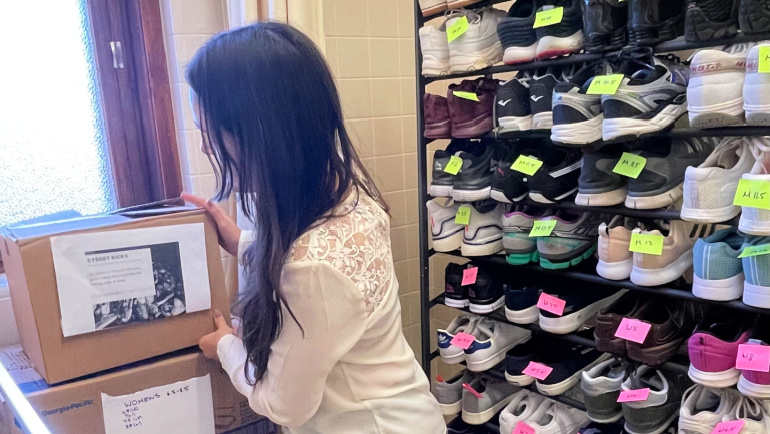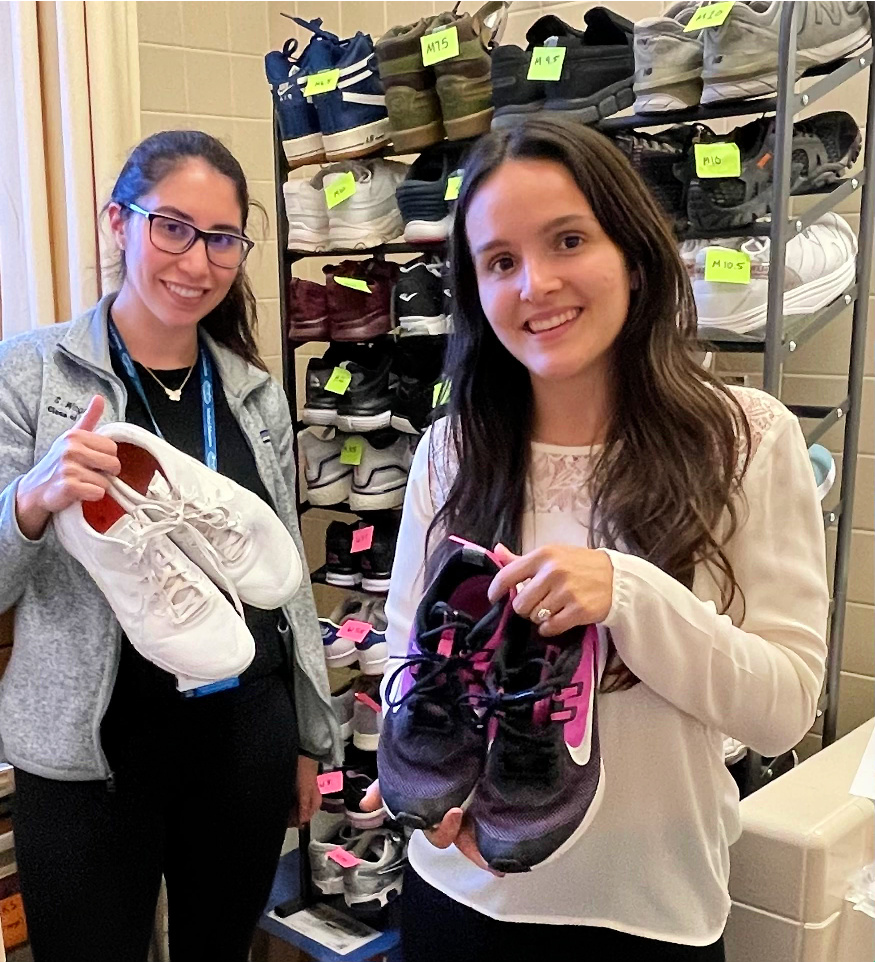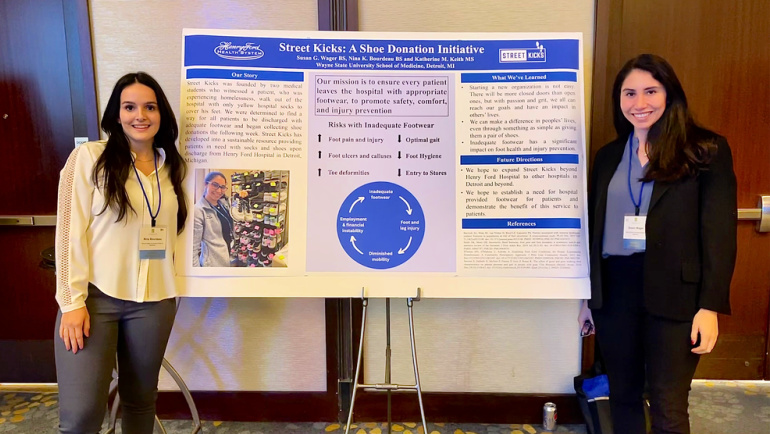
After a rotation shift at Henry Ford Hospital, Wayne State University medical students Susan Wager and Nina Bourdeau watched a patient who was experiencing homelessness walk out of the hospital with only yellow hospital socks to cover his feet. Deeply concerned about the man and others like him, Wager and Bourdeau were determined to find a way for all patients to be discharged from the hospital with adequate footwear. The pair got to work immediately after that shift, purchasing a shoe rack and asking for shoe donations from colleagues, peers, friends and family.
They founded Street Kicks, a School of Medicine student organization that provides free shoes and socks to patients in need who are discharged from Henry Ford Hospital.
“The experience made me question how we could give someone all the medical treatments in the world but not something as basic as shoes. We learn a lot about treating the whole patient at Wayne State – the answer to someone’s problem isn’t always exclusively medicine,” Wager said. “We’re taught to look at everything that plays a role in someone’s overall well-being, and in this case, adequate footwear can be a very real social determinant of health.”
Treating the whole patient
Inadequate footwear has a significant impact on musculoskeletal health and injury prevention and can create a cycle of problems. Beyond foot pain, injury and toe deformities, a lack of appropriate footwear can result in diminished mobility and hygiene. In turn, a person may face employment and financial instability, which then further limits their access to footwear and other basic necessities.
Addressing such social determinants of health is a key focus at the School of Medicine. Wager and her peers understand that health is about so much more than medicine, exercise and nutrition – it’s also about eliminating environmental and societal barriers to care.
“A lack of shoes may lead to higher risk of injuries and decreased mobility, which can contribute to patients ending up back in the hospital.” Wager said. “Beyond the health issues, not having shoes can quite literally be prohibitive for someone seeking employment.”
The idea that a single – and sometimes direct – action can make an immediate impact was especially meaningful for Wager, who plans to pursue a career as an orthopedic surgeon.
Patients have been appreciative for the holistic approach to care.
“It makes a huge difference for people, and they’re so grateful,” Wager said. “We’re not only addressing a health issue here, but we are also communicating to patients that we care about them beyond their immediate medical need.”
Putting feet to the ground

Since launching in July 2022, Street Kicks has collected more than 100 pairs of shoes and distributed approximately 50 pairs. The shoes — new and gently used men’s and women’s sneakers and boots — are collected by the students and then stored in a workroom closet at the hospital for ease of access.
Signage throughout the hospital alerts staff to the organization’s free resources, and patients are offered shoes and socks if someone on their care team notices they may be in need or if they ask upon discharge. While most patients who engage with Street Kicks are experiencing homelessness or housing instability, others have lost their shoes in an emergency.

The idea was inspired in part by Wager’s previous experience working at MedWish International, a nonprofit that repurposes and distributes surplus medical supplies and equipment based in her hometown of Cleveland. Through that organization, she gained experience managing inventory, donations and the distribution process. Wager said the initial response to Street Kicks was positive, although it proved to be a challenge finding a location for inventory.
“Many people don’t think about this problem – they just put their own shoes on in the morning and think nothing of it,” she said. “When we started conversations about people not always having that luxury, everyone agreed Street Kicks was a great idea.”
A sustainable future
Although Wager and Bourdeau have recently completed their rotations at Henry Ford Hospital, the incoming cohort of third-year medical students has already stepped up to continue the program. They plan to engage other School of Medicine students in leading shoe drives and helping with donations. Street Kicks has also collaborated with the like-minded organization Street Medicine to provide more opportunities to help patients in need.
Wager said she hopes to see Street Kicks expand to other hospitals in Detroit and beyond, and to establish a precedent for hospital-provided footwear for patients in need.
“We can make a difference in people’s lives, even through something as simple as giving them a pair of shoes.”
How you can help
Street Kicks accepts new and gently used shoes (sneakers and boots) and has the greatest need for men’s footwear in sizes 10 to 13. To learn more or support the organization, email streetkicks1@outlook.com and follow them on Instagram @streetkicksdetroit.